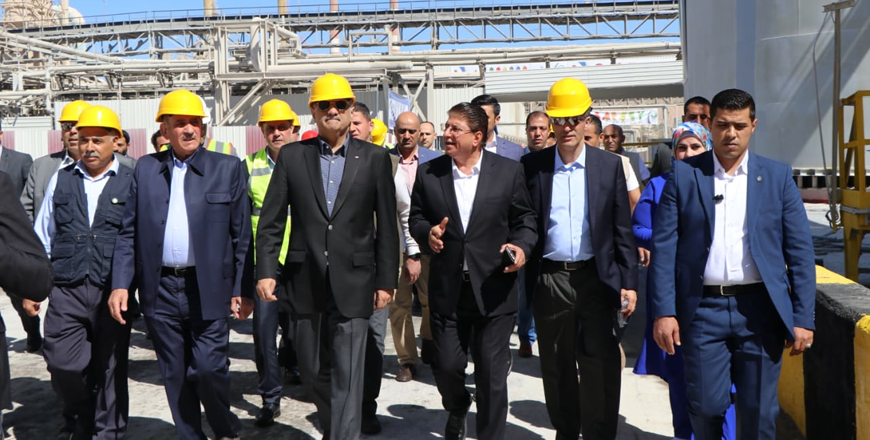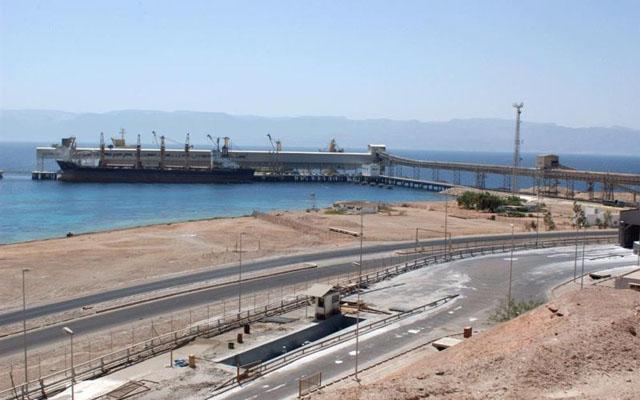You are here
PM takes inspection tour of Aqaba’s industrial sector
By JT - Mar 11,2023 - Last updated at Mar 11,2023

Prime Minister Bisher Khasawneh during a visit to Aqaba on Saturday (Petra photo)
AMMAN — In implementation of Royal directives, Prime Minister Bisher Khasawneh on Saturday took an inspection visit to Aqaba, the Jordan News Agency, Petra, reported.
Khasawneh toured the Jordan Phosphate Mines Company (JPMC) and inaugurated a number of projects at its Industrial Complex.
Meeting with JPMC’s Chairman of the Board of Directors Mohammad Thneibat, in the presence of a number of ministers and other Aqaba officials, Khasawneh was briefed on the company's work and future plans.
Following the inauguration of a project refurnishing phosphoric acid tanks, automatic aluminium fluoride units and a power station in the Industrial Complex, Khasawneh inspected the greening project of Jabal Al Jibs.
During his visit to the JPMC, Khasawneh stressed Aqaba’s importance to achieving the objectives of the Economic Modernisation Vision (EMV), adding that the city possesses the potential to become one of the 50 best cities in the world.
Indicators reveal that Aqaba is capable of attracting more investments that contribute to achieving development and providing job opportunities, he said.
The PM highlighted the need to maximise the added values of phosphate and potash companies by focusing on fertiliser industries and pharmaceutical manufacturing, which would support the national economy, enhance revenue, create employment opportunities and achieve higher economic growth rates.
Over 10 years, the EMV aims to provide one million job opportunities, achieve a growth rate of 5.5 per cent, attract foreign investments worth $1.5 billion and boost domestic investments by $2.5 billion annually, he said.
Khasawneh commended the efforts of the mining companies, especially the phosphate and potash companies, as part of their social responsibility to develop communities, pointing to the JPMC’s contributions which have totalled JD51 million over the past few years.
The PM underlined the need to bolster companies’ social development role, especially in Aqaba and the Kingdom’s southern regions.
Voicing pride in JPMC’s expansion of phosphate and potash companies to European markets, Khasawneh pointed to the importance of the company’s contributions to developing Aqaba’s industrial port and public ports.
Khasawneh urged to increase public safety measures in the industrial complex and ports in Aqaba, to guarantee the security and safety of workers, referring to the need to devise an urgent plan for refurbishing ammonia tanks and other tanks containing hazardous materials.
Instructing the concerned authorities to employ advanced digital control systems capable of alerting authorities of any accident, whether caused by natural factors or human error, the PM directed a detailed study to be conducted on the status of ammonia tanks in Aqaba and their conformity with international standards.
Khasawneh referred to the toxic gas leak that took place in Aqaba in 2022, stressing that the unfortunate event must not be repeated.
Thneibat said that the company’s current plans are inspired by the Royal vision to attract investments, build partnerships, and open to global markets.
The company’s 2023-2027 plan came as a translation of the EMV by establishing more projects to serve the vision, he said, pointing out the company has allocated over $1.6 billion over five years to increase its projects.
JPMC CEO Abdelwahhab Rawad noted that the company’s production of phosphates reached more than 11 million tonnes in 2022, with sales amounting to 10.8 million tonnes, which constitute “unprecedented numbers in the company’s history”.
The company was able to enter the European market through Norway and Poland, he said, adding that the JPMC was also able to enter the markets of Brazil, the US, India, Bangladesh and other countries.
He also referred to a number of projects under study for the production of yellow phosphorus, fertilisers and other materials, in addition to logistics projects, such as the construction of phosphate storage warehouses, the expansion of the phosphate port and the de-salination of seawater for industrial water needs. The total cost of the projects included in the plan is estimated at about $1.664 billion, he added.
The meeting was attended by Energy Minister Saleh Kharabsheh, Interior Minister Mazen Faraya, Industry and Labour Minister Yousef Shamali and Investment Minister Kholoud Saqqaf.
Related Articles
AMMAN — Social Security Investment Fund (SSIF) CEO Ezzeddin Kanakrieh met with Chairman of Jordan Phosphate Mines Company’s Board (JPMC) Moh
Sales of raw phosphate and fertilisers are likely to reach eight million tonnes this year, according to Jordan Phosphate Mines Company (JPMC) Chairman Amer Majali.
AMMAN — The Jordan Phosphate Mines Company (JPMC) on Monday decided to prepare a tender for installing ammonia tanks in the company’s indust
















